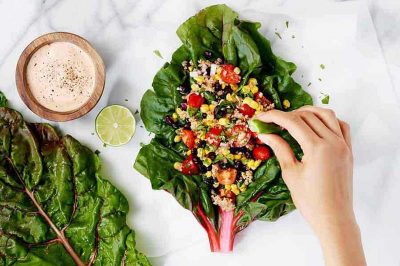Eating As If All Life Matters

I know, I know. He’s my husband, but… Bill’s new book is incredible. He has really put the “macro” into a fresh approach to nutrition. Eating As If All Life Matters is the result of his fifty-odd years of study, experience, and insight. He has managed to combine all the issues that affect what we eat. He talks about the influence of medicine, politics, and nutritional mythologies, as well as how our diet affects the environment, social justice, and the mind and body connection. Most importantly, for me, is how he connects the dots in a way that is ethically consistent and points to a better future for all life on the planet.
This book goes deep – it’s almost 400 pages long (with 60 recipes from yours truly). Bill cites over 300 studies as well as his own personal story of health and healing to illustrate the text. You don’t have to believe me, though (I might be prejudiced).
LISTEN TO WHAT ONLY A FEW OF OUR EARLY READERS HAVE SAID:
“I would not hesitate to say that this is the best resource available in that it incorporates in a comprehensive way the connection between agriculture, animal welfare, environmental issues and the corporate abuses of big business. It is not only informative but a wake-up call.” Martha Clayton Cottrell MD FAAFP
Bill Tara is not just one of the pioneers of the health food movement, he is an expert on macrobiotic nutrition and veganism. He and his wife, Marlene Watson-Tara, are the "dynamic duo" of vegan macrobiotic instruction and coaching. But Bill is also a philosopher of health and nutrition, and an expert on all matters ecological. In this marvelous book, Bill displays all of his many talents, and shares his considerable wisdom in an accessible and engaging way.
Professors Gary L. Francione & Anna E. Charlton, Rutgers University
“This is a must read book for anyone concerned about the environment, suffering of animals and human and non-human health” Anteneh Roba MD, founder of the International Fund for Africa.
“Once we see the connections it is easy to see how we can heal our species and the world in one stroke.”Dr Nandita Shah, recipient of the prestigious Nara Shakti award, India’s highest award for women.
“In no other book will you find such a comprehensive discussion of the five factors that should be driving our food choices – beginning with our own health – followed by respect for all life, the environment, social justice and the wisdom of ancient traditions”. J Morris Hicks, author of Healthy Eating, Healthy World.
OUR MACROVegan VISION
People sometimes ask what is different about what we teach at our workshops, coaching courses, and seminars. Eating As If All Life Matters is a perfect expression of our vision. We believe that social justice, health, and environment are all important aspects of nutrition and not simply side issues. Our commitment is to all life on the planet, human and non-human alike. This book shows why this must be if we are to survive.
Our life’s work inspires us daily, and together all of us can make a difference to change our world to one of peace for all who live here.
I have included links to amazon.com U.K. and amazon.com U.S.A. If you purchase the book, Bill would be very grateful if you could add a review. Thank you for your support in our work.
In good health,
An Ethical Approach to Nutrition

In the past several months there have been a number of scientific reports released regarding the benefits of a “plant-based” diet. The response from those in the vegetarian, pescatarian, flexitarian, reducetarian (my favourite is semi-vegan) and even some macrobiotic folks has been resounding. The phrases, “finally” and “about time” and “we were right” were quick to pump up the idea that something big was afoot. Really?
The recent EAT/Lancet study has hit the headlines for a whole day. It is an impressive forty-seven-page report that claims to put forward a radical eating program titled, “Food for the Anthropocene”. Problem is that the primary thrust of the study is not so different from the McGovern Report published in 1977 except in degree. The earlier report has been repeated by the WHO and many international organizations over the past 40 years with regularity. We might ask why, with all this science, nothing much has gotten done.
Some say that actually much has been done, “My god there’s tofu in the supermarket” or “I can get organic avocado’s in the health food store”. I question the depth of that response. What has happened most spectacularly is that the food industry that creates the problems has simply learned to adapt with small concessions. Not only do they project improvements but they can make bigger profits as well. Fairly small tweaks like using Palm oil instead of butter, or “fructose” instead of sugar, create the illusion of improved “healthy” products. All the while they continue to rake in the profits from the massive amounts of junk they produce.
The parallels to the issue of climate change are remarkable. The science is unchallenged except by those with a vested interest and the causes are known and yet we avoid real action. We hope that science will come up with a solution or that new technologies will solve the problem. We are excited and reassured when international banks or corporations announce, “green initiatives”. When nations gather in exotic retreats such as Davos the rhetoric is deafening.
The dynamics are the same with the diet debate. We know that meat, dairy, sugar and chemical additives kill us. The reports quote the statistics, all buried in bureaucratic science speak but we all know the truth. We know it the same as we know that the pollution of air, water and soil will kill us and all life on planet earth and yet we seem paralysed.
The fear of changing our economic system, our values and our daily behaviour lock us in a state of cognitive dissonance. We simply cannot admit that we were so very, very wrong. We cannot admit that there are fault-lines in our social structure. Rather than accept the challenge of change we sublimate the fear and sink into helplessness, cynical acceptance or hostility.
Part of the problem is that the authors of the endless nutritional guidelines and the international committees on global warming try too hard to make solutions acceptable. They make assumptions of stupidity and inability that may simply reflect their own limitations. We are told that “the people” will never accept the obvious steps to reverse the damage, they need to have baby steps.
While all the science in the EAT/Lancet report shows harmful effect of meat, fish and dairy on human health as well as the devastating environmental impact we are told to simply reduce them. The reductions may seem severe, but they are still reduction not avoidance. By the time reports such as these are translated into government policy they mean next to nothing. This is like telling an addict that crack will kill you, so just smoke two pipes a month.
This approach is been proven to not work, over 40 years of experience shows us that. If you want people to listen, you need to speak clearly and unequivocally. You need to demonstrate commitment by walking the talk. The movements to stop climate change and transform the food system are revolutionary movements or they are nothing. They require activism and a high level of personal commitment.
Even among some well-respected advocates of plant-based eating wiggle room is created for “maybe a little dairy once in a while” or “fowl on special occasions” or “perhaps a little fish once or twice a month”. When the hypocrisy of these suggestions are mentioned they are countered with claims of being rigid or extreme. But the real extreme is the modern diet that kills both humans, animals and the planet. The real rigidity is the inability to give up irresponsible food choices.
Until there is an ethical approach to eating that includes our relationship with nature, non-human life and social justice we will flail around trying to escape the inescapable. Our resistance simply makes our problems worse and exhausts us into a state of limbo. All is needed is that we embrace healthy changes without apologies or excuses and embrace positive change.
According to Wendell Berry, the American farmer, poet, activist and novelist, “Eating is an agricultural act.”This is a statement of individual empowerment, because it means that every time we make choices about what we eat and who we purchase it from, we are voting on the direction in which we want our food system to move. Let’s make good choices, Join the Evolution.
In good health
Bill


